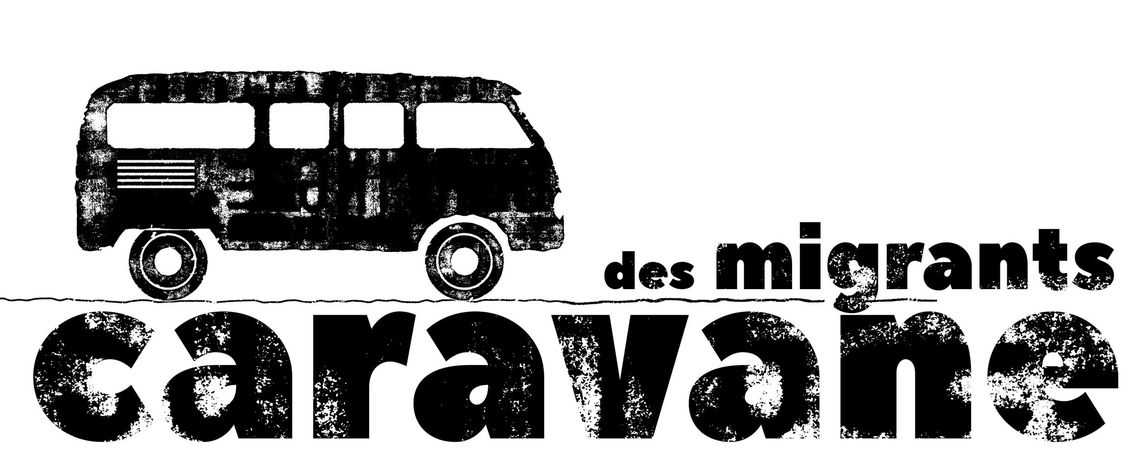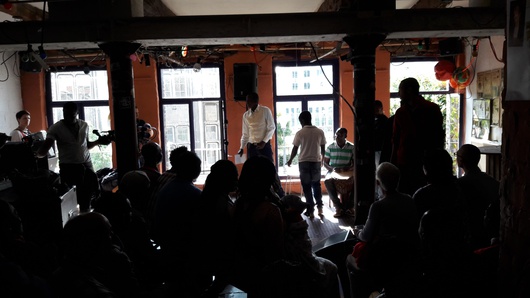
"Undocumented immigrants are exercising the citizenship they have been denied"
Published on
Translation by:
Jennie NormanCaféBabel went to Liège last Friday 23rd September to meet ‘La caravane des migrants’ (the migrant bus), an initiative backed by a collaberative platform of undocumented worker collectives, trade unions and various community organisations. They offered up a diverse program, including a meeting with the authorities, slam poetry, comedy skits, and citizen discussions.
It was late morning when the migrants arrived in front of the City Hall in Liège, where the Mayor (Willy Demeyer) was there to welcome the entire delegation. Their objective was to front a claim for undocumented immigrants, defending them against their often-negative portrayal in certain sections of the media.
After this, the delegation went to see the Casa Nicaragua (la Casa), an organisation based up in the Pierreuse neighbourhood who work on north-south relations. We went along, curious to meet the community activists who were defending undocumented immigrants.
The 'Casa' are based in an old renovated house. It has a certain charm unique to the neighbourhood on the edge of the historic centre, behind the City Courthouse. With the early autumn sun high in the sky, the atmosphere oozed Latin America. We went inside the Casa to witness the next part of day's program. The migrant artists didn't take long to arrive.
This is how we met Odette, the owner. She explained to us that the 'Casa' supports the initiative and adds that: "one of the places that Liege’s migrants live in is a former horticultural school in the Burenville neighbourhood. They are going to be evicted because the city council owns the building and is going to sell it."
"Never mind the danger, we had to brave it…”
The slam poetry starts at around 1.45. The migrant slammer tells of his solemn longing for the land he has left behind ("back there, community is a bedrock. Back there, solidarity has meaning" forced out by war, a precarious economic situation. He also recounts his difficult journey ("without knowing where my steps were taking me, without feeling tiredness, hunger, thirst. Never mind the danger, we had to brave it..."). And his encounters with other men and women brought together in the same situation ("They came from Raqqa, Rassoul. They came from Libya, Afghanistan, Palestine, the banks of the Zambezi, Lake Chad and all over"). He expresses the confusion often experienced by migrants when faced with the political situations in the war zones they are fleeing from. He talks about their loss of identity, ("undocumented, unemployed, wanted to avoid being condemned to wander, wanted to avoid being a ghost between two worlds, belonging to neither").
Another migrant then took the floor and addressed Théo Francken, the Belgian asylum and migration minister. He calls him out on the plight of migrant workers, accusing him of spreading fear among the Belgian population and "leading them to believe that immigrants are the cause of their misfortune". This statement, more political in nature, is followed by a woman who talks about her experience at the site in Burenville, which in her opinion is a place of solidarity and mutual assistance. Yet her words would later go on to be contradicted by another resident. The show ends with a skit performed by the migrants, a mix of protest and testimony.
The skit performed by undocumented migrants at the Casa Nicaragua | Denis Pepic
Damienne Martin, the project coordinator, explains that "undocumented immigrants are exercising the citizenship they have been denied". The caravane des migrants say they want to activate exchanges between the various associations defending undocumented migrants and the migrants themselves, all while maintaining a constant dialogue with legal citizens.
Presenting an alternative migrant image
Next, different immigrant groups take to the floor. Several initiatives emerge: 'The Undocumented Migrant Journal', 'The Brussels Committee of Women Migrants', 'Migrant-TV', the 'CSC Undocumented Worker Collective' and the 'Charitable School'. For the trade unions, it is essential that they support the migrants' activities to avoid a latent 'social dumping'. Undocumented immigrants are asked to work under the table in conditions that don't comply with Belgian standards. The aim of these initiatives is to change the migrants' public image while working to create opportunites for dialogue between the different socio-economic strata of Belgian society.
The last part of the day revolved around discussion. Firstly, the testimonies. An Algerian migrant offers up his point of view on the situation in Burenville. "Despite the prevailing organization and solidarity, the presence of multiple cultures sometimes creates ideological and political issues. Nevertheless, winter and the cold represent the biggest problems and we need to come together to get through difficult times. Even within the site itself, socioeconomic inequalities exist."
After this follows an examination of the initiatives currently in place. Saïd, an active member of Migrant-TV, deplores the fact that the reality of migrant life and the actions they undertake are rarely reported: "depictions in the conventional media are too pejorative and simplistic". Abel, from the collective of the SCC undocumented workers adds that "the goal is to bring the problem to Belgian citizens and to deconstruct prejudices." Rosario Marmol Perez, initiator of the school of solidarity recalls "that 50 years ago, a wave of immigration came to Belgium. Today, the people who came from that wave are key people for understanding the present situation, although the context of full employment is no longer a reality. We must activate networks of solidarity and show the complexity of the migrants' plight."
Two questions finished the discussions:
What binds us? What can we do together?
The main idea coming out of these debates was that we need to focus on projects that bring together the whole of society, to share living environments and create links so as to protect undocumented migrants and to stop excluding them.
According to Damienne Martin, the migrant bus aims to visit as many cities in Belgium as possible. The next stops for the bus are Verviers, Mons and La Louvière.
Translated from « Les sans-papiers exercent cette citoyenneté qu’on leur refuse »




